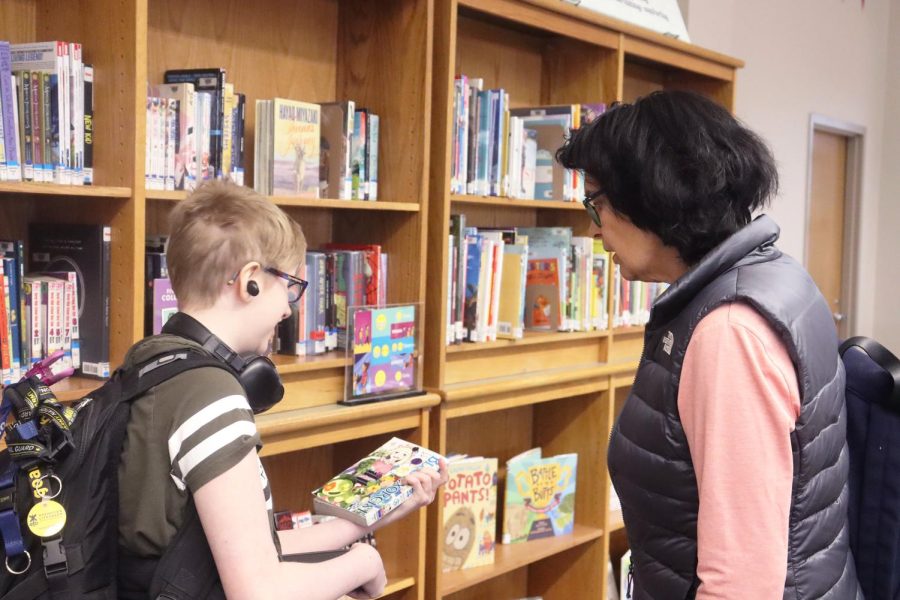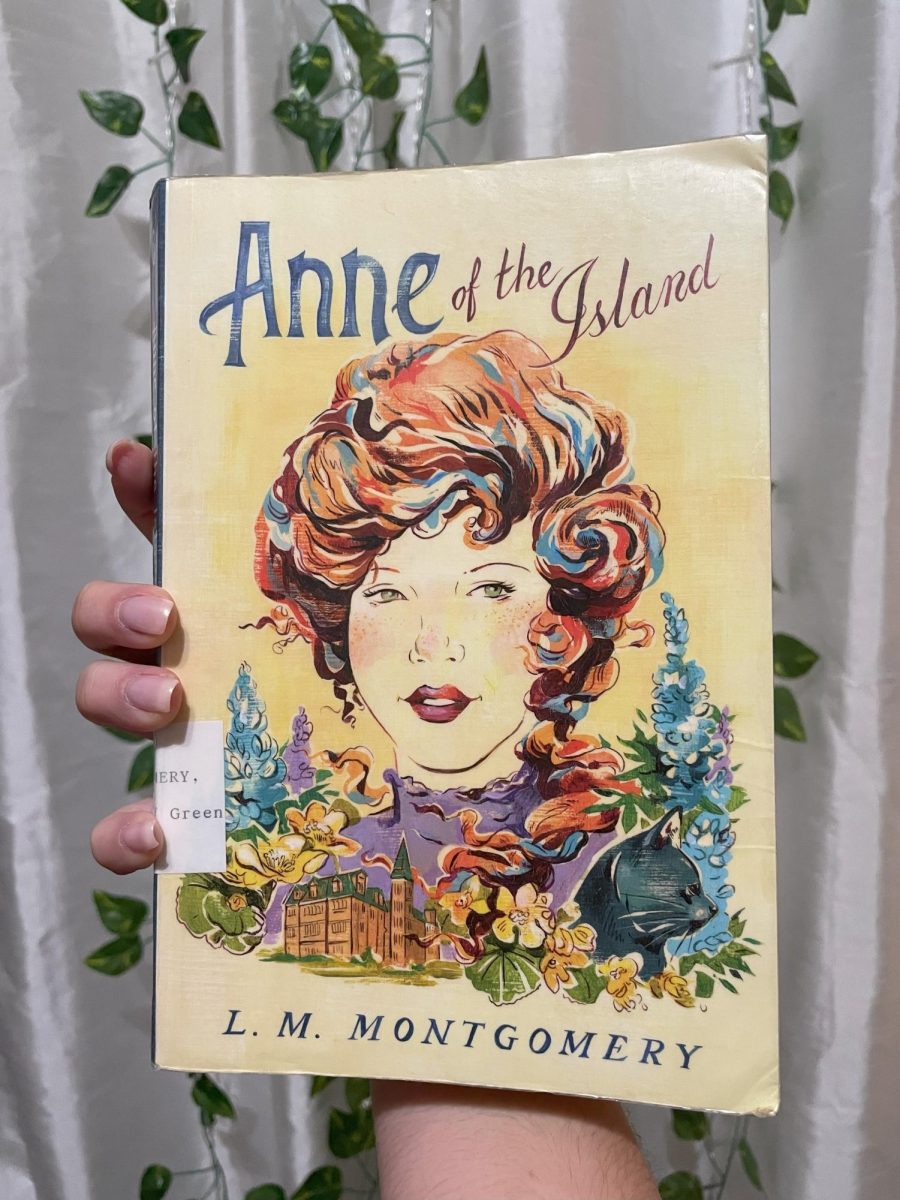Students work to keep books available
Student-led group opposing book restrictions gains nationwide attention
Elly Stopczynski, senior, talks to reporter Sue Halpern about one of the graphic novels in the library.
April 18, 2023
After the Nixa School Board voted to remove two books and restrict one book in the Nixa High School library during the spring of 2022, student push back has been building. The number of restricted books has since risen to 15.
Junior Thomasina Brown has been active in the student-led anti-book banning group. She was motivated by one of her peers to participate.
“Originally, I was asked by [a friend] to join the [book ban] group — so I did,” Brown said. “It seemed very interesting to me. Going to the school board meetings really motivated me to continue with that journey.”
Senior Meghana Nakkanti has been a loud advocate for the books since the challenges arose last year. Nakkanti emphasizes that context is important when evaluating a book.
“I would push back the narrative that [these books] are inappropriate,” Nakkanti said. “Obviously, when you take one or two pages of these books out of context, it does seem pretty crazy that this material is included. Context is everything and the fact that some parents are advocating for banning these books without reading them or situating these scenes in context is very telling.”
While some students in the school focus on advocating for the books, some aren’t as interested. Senior Hannah Vashaw is one of those students.
“[The bans] are slightly annoying to hear,” Vashaw said. “I heard that [news sources] wrote about students going to the school [board], after that I didn’t hear anything. Now, I hear it again, but I don’t think they’re making any progress. I get both sides. I understand if parents don’t want sexually explicit books in the school. At the same time, I understand that they’re [taking] away freedom from kids. My first thought was that there are plenty of libraries outside of school [with those books]. Why make this whole ordeal that [isn’t] really going anywhere?”
Nakkanti said she believes that books let readers experience new things.
“We benefit [from these books] in a lot of different ways — we understand each other more, we understand other people more,” Nakkanti said. “It’s more understanding the lives that other people live that makes us more empathetic, makes us kinder, that makes us actually be able to work towards the solutions of the problem [in] these books that we’re talking about, rather than trying to hide them from view. Especially because a lot of the issues the books are talking about, whether it’s violence or assault or racism or bigotry, are all true experiences from people [I] know.”
Sue Halpern, staff writer for The New Yorker magazine, visited Nixa for a few days to fully immerse herself in the story she was writing about the book controversy. Halpern quickly became keen on visiting when she heard about the newly passed state law addressing potentially pornographic materials in the classroom.
“I got really interested in Missouri in particular because of SB 3775,” Halpern said. “People focus on the larger states that are more coastal like Florida or Texas, where we all sort of know things are happening, but I think people don’t think that much about the Midwest.”
Due to pending litigation, the board was unable to comment about the current circumstances. However, Zac Rantz, chief communications officer of Nixa Public Schools, explains how the books were taken into consideration by the school board.
“Each of the books were reviewed by the board prior to the vote taking place,” Rantz said.
The student-led group has offered multiple solutions that don’t require the removal of books.
“We’ve done everything in our power to prevent [these restrictions],” Nakkanti said. “We’ve talked about alternative solutions the school should [genuinely] consider. I think the parents should also consider [our voices]. We’ve suggested content warnings for books that might be difficult to digest. … We’ve talked about possibly only restricting to upper grades, which the librarians could easily check when you put in your ID number. We’ve offered countless solutions to the problem, but it’s very obvious that the only solution people will settle for is a complete removal. Us, as students, we’ve done everything that we could [but] it’s just a matter of trying to make the most out of the situation around us — like trying to read the books outside of school.”
In interviewing the student group for her story, Halpern said she was stunned at some of the backlash the student group received during their activism.
“The most shocking thing [I heard] was how disrespected [students] were when they spoke — how some of them were heckled. It seemed just so uncivil,” Halpern said. “It’s hard for anyone to stand up and speak, particularly when it’s contentious, but the fact that they were young people in an audience of angry adults was even harder. It took a lot of courage and the fact that they were disrespected, heckled and made to feel [bad] was [shocking].”
Brown said she is hopeful that with more student representation, the school board will reconsider its stance on book restrictions.
“I want more student involvement with the process,” Brown said. “Right now, it’s just the school board making decisions and voting on what happens. Students are able to speak with the school board, and we have, however it has no effect so far. I would hope more student involvement would make a difference, but at this point I’m not really sure.”
With a generally supportive student body, some are confused as to why some books are being removed from the shelf.
“Whenever we have conversations in the classroom [about the bans] a lot of students will say, ‘Oh why are these books being banned?’ and then people who have been more active in the process will answer — there’s just that sense of camaraderie in the fact that we think this is kind [of] crazy,” Brown said.
Each book that is debated deals with different life experiences.
“Each of the books — what they do really well, is go in-depth into a singular perspective,” Nakkanti said. “ … All of the stories are so unique and so different and so reflective of the experiences of the groups they represent. All of those books tell us something new and different.”
Halpern said books have the power to help students develop crucial skills for life outside of the classroom.
“People are going to graduate in a few months and move onto the next part of their lives,” Halpern said. “They know things, they’re not babies. It’s not as if by banning these books, these issues don’t exist. They’re still there. That’s the irony of it — they think these books have so much power. As an author, I’m happy that [they] think books have that much power, but what they have is the power of empathy, the power of letting you understand a different world that the one you live in is like — that’s their real power. I fear that that’s the thing they fear the most — is having sympathy and empathy for people who aren’t like them.”









Elizabeth • Apr 29, 2023 at 12:40 pm
All of the students at Nixa are awesome and brave. You will make great community leaders and citizens!